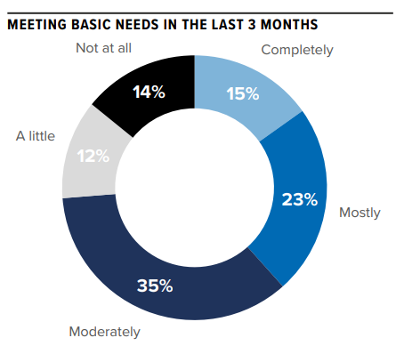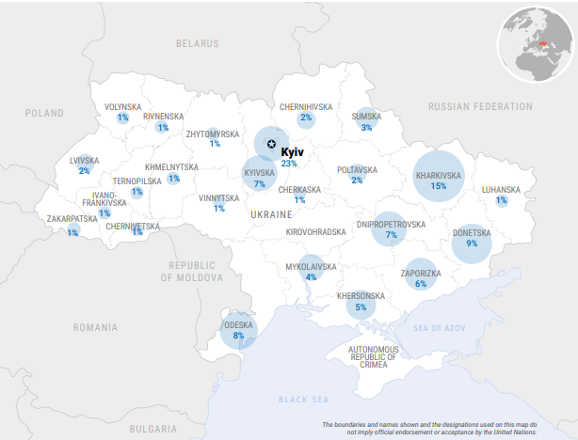Lives on Hold: How Do Refugees From Ukraine See Their Future?

What are the profiles and socio-economic conditions of refugees from Ukraine in Switzerland? What are their intentions regarding return? A survey by UNHCR, the UN refugee agency, in cooperation with the State Secretariat for Migration and Ipsos SA Switzerland, provides answers to these questions.
UNHCR, the State Secretariat for Migration of Switzerland (SEM) and Ipsos SA Switzerland conducted jointly a survey of refugees from Ukraine in Switzerland to gain insights into their situation and intentions. The survey targeted a random sample of 10,000 Ukrainian refugees aged 18+ with protection status S in Switzerland. The data, collected at the household level, provides information on over 2,800 refugees. The report explores household profiles, socio-economic conditions, their perspectives on inclusion and plans, as well as factors influencing their decisions.
The survey is one in a series conducted by UNHCR on the intention of refugees from Ukraine. The objective is to prioritize refugees’ perspectives in discussions about their future and to offer evidence-based insights for inter-agency responses in collaboration with host governments.
Profile of Refugees From Ukraine in Switzerland
Similarly to other host countries, the majority of refugees from Ukraine in Switzerland are women and children (79%). A significant number hold a university-level education or higher (69%). The primary regions of origin for refugees fleeing to Switzerland are the eastern part of Ukraine (38%) and Kyiv (24%) with a notable proportion also originating from the southern part of Ukraine (16%). Most refugees arrived by August 2022 (82%).
Most respondents were residing in homes owned by themselves or someone in their household (82%). When asked about the condition of their homes, a slight majority (52%) indicated that their house or apartment was intact. However, regional disparities were evident, with a quarter of respondents from the eastern region of Ukraine reporting complete damage to their homes.
Education and Employment
In Switzerland, school-aged children attend public schools. However, one-fourth of them also participate in online Ukrainian schooling on top of their regular classes in Switzerland.
As for employment among Ukrainian refugees, the reported figure (21%) corresponds with the State Secretariat for Migration’s (SEM) current data. Half of those employed report that their current professional activity is below the level of their previous employment in Ukraine. Roughly one-third are actively seeking employment, while a quarter are undergoing vocational training.
The primary barrier to accessing the Swiss labor market was cited as a lack of proficiency in the local language (77%). Other challenges include a scarcity of job opportunities aligned with one’s skills (19%), difficulties in education and skills recognition (13%), and a lack of information on navigating the labor market (9%).
Health, Quality of Life, and Income
The majority of respondents report being in good or very good health. Yet, one in eight (13%) indicate that a family member requires care due to disability or illness. Nearly half of the refugees mentioned a health issue affecting their daily lives in the past six months preceding the survey. Interestingly, those who arrived in spring 2022 expressed a higher quality of life compared to later arrivals.
While the majority can meet their basic needs with their income, a quarter struggled to do so in the three months prior to the survey.
 Intention to Return
Intention to Return
Roughly one-third of refugees expressed a desire to return to Ukraine at some point, while the majority (40%) reported being undecided, and around a third had no intention to return. Older adults, particularly those with family ties in Ukraine, showed more inclination towards planning a return, particularly those with a spouse or children in Ukraine. Primary obstacles mentioned include security concerns, occupation of their former area of residence, limited access to adequate healthcare, as well as a lack of work and livelihood opportunities.
Comparing Survey Results
When comparing Ukrainian refugees in Switzerland with those in other European countries not bordering Ukraine, similarities exist in household size and age demographics (Lives on Hold #4). However, Swiss respondents are less likely to be female (74% vs. 86% regionally) and show higher educational attainment. Switzerland also hosts three times as many households with older individuals (aged 60+) compared to non-neighboring countries of Ukraine (9% vs. 3%).
In terms of accommodation, refugees in Switzerland are more likely to live in shared housing and less likely to rent independently. Employment rates are notably lower in Switzerland (21% vs. 40% regionally).
Significant disparities exist in relation to the future intentions between households in Switzerland and those across non-neighboring countries of Ukraine. In Switzerland, households are almost four times more likely to express no intention of returning permanently to Ukraine (27% vs. 7%). While 30% of the households in Switzerland are hoping to return one day and 40% are undecided, regionally, 57% express hopes of returning one day and 24% are undecided.
Refugee households in Switzerland are more likely to cite safety and security concerns (68% vs. 47%), but they are also more likely to indicate plans to stay because they feel integrated (34% vs. 11% regionally) and because their children attend school in Switzerland (24% vs. 11% regionally).
The insights obtained from the “Lives on Hold” surveys are instrumental in identifying areas requiring action. They ensure an evidence-based approach to policymaking, which includes the perspectives of refugees. UNHCR thus advocates for the continuation of such surveys not only for refugees from Ukraine, but also for other refugee groups.
Fiona Mubi is a Protection Expert at the UNHCR Office for Switzerland and Liechtenstein. She is responsible for monitoring the protection situation of refugees from Ukraine.
References:
-UNHCR, SEM, IPSOS SA Switzerland, Intentions and Perspectives of Refugees from Ukraine in Switzerland, December 2023.
–Lives on Hold #1, July 2022.
–Lives on Hold #2, September 2022.
–Lives on Hold #3, February 2023.
–Lives on Hold #4, July 2023.
–Lives on Hold #5, February 2024.



